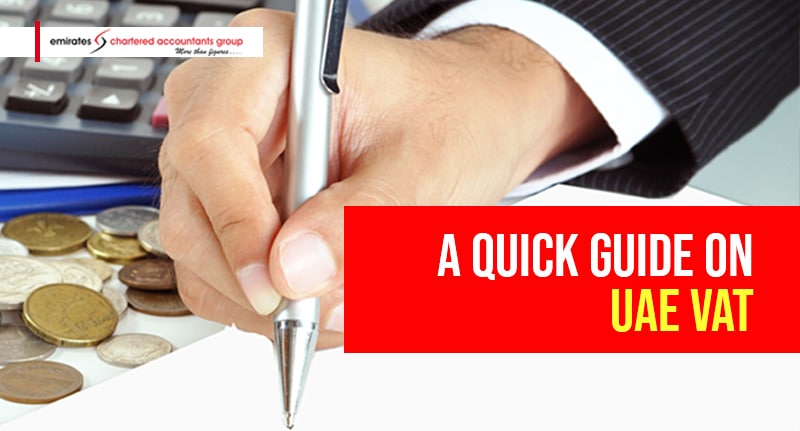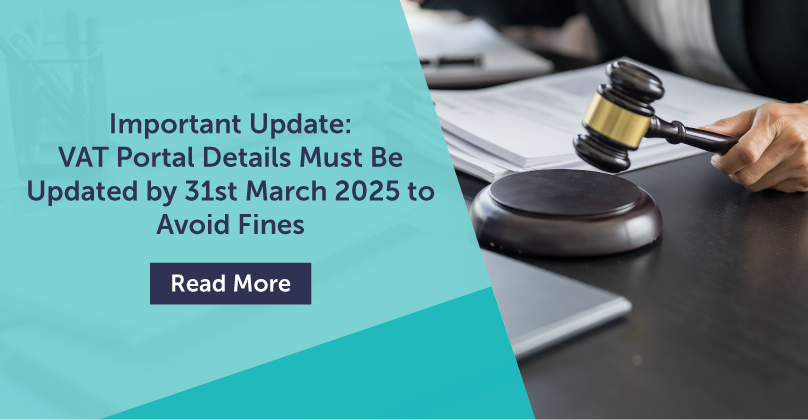
VAT in UAE a Quick Guide
Value Added Tax (VAT) in UAE was introduced on 1st January 2018. The Federal Tax Authority (FTA) is responsible for all administrative and collection of taxes in the UAE. The introduction of VAT in the UAE had lead to an increase in the revenue for the government and less dependence on oil resources. Also, VAT in the UAE will make the business and the consumers more responsible for understanding their responsibility towards the payment of taxes and the welfare of the economy and the country.
In UAE, the categories of goods & services that fall under the VAT in UAE are as bellow:
1.Taxable Supplies:
VAT in UAE is levied on taxable supplies which standard rate at 5% and zero-rated supplies at 0%.
2.Zero-rated supply:
A zero-rated supply is a taxable supply on which VAT is charged AT 0% and for which input is deductible. Some of the zero-rated supplies include:
- International Transportation of passengers & cruise
- Health care services
- Export of goods & services
- Residential Buildings (First sale)
- Education Institutions
- Crude oil & Natural gas
- Medicines and Medical equipment
It is important to understand that zero-rated supplies are also taxable supplies and has to comply with the procedures required as per UAE VAT Law.
3.Standard Rated Supply
A taxable supply at the standard rate is a supply on which VAT is charged at 5% and on which input can be claimed.
4.Exempt Supply
Exempt supply is a supply on which VAT is not charged and on which input cannot be recovered. Some of the exempt supplies are local passenger transport, bare land, certain financial services, and subsequent supply of the residential building. Reverse Charge Mechanism in UAE Reverse Charge Mechanism is applicable to the import of concerned goods and concerned services in UAE.
Under the reverse charge mechanism, the customer is responsible for the payment of tax and reporting in the vat return. The supplier will not have any responsibility to pay VAT. Designated Zones As per the UAE VAT Law, designated zones shall be treated as outside the state i.e. UAE and no VAT will be due provided it satisfies the following conditions.
- It is fenced geographic area which has custom control to control the entry and exit for the movement of goods
- It will have internal procedures for storing and keeping the goods
Some rules for designated zone companies
- Supply of goods made within the designated zones will be considered out of the scope of UAE VAT Law as long as goods are not consumed or altered during the transfer.
- Supply of services in the designated zones will be considered as supply in the mainland and will be subject to 5% VAT.
VAT Registration in UAE VAT Registration is mandatory for individuals and companies in the UAE, having taxable supplies of AED 375,000. A business may also choose to register on a voluntary basis if its taxable supplies exceed AED 187,500. Once you register for VAT, at the end of each tax period, the VAT Registered businesses must file the VAT Return to the FTA. If the taxable person fails to register the business within the time frame, then he will be subject to the late registration penalty of AED 20,000/- as per the Law.
VAT Return in UAE The taxable person must file VAT Return on a regular basis that is on or before 28th of the end of the tax period. VAT Return in UAE can be filed either quarterly or on a monthly basis based on the annual turnover of the company. The authority may allocate tax period based on each type of businesses. If the taxable person fails to file the VAT return within the due date, then he will be subject to administrative penalties as per the cabinet Resolution No. 40 0f 2017 on Administrative penalties for violation of Tax Laws in the UAE.
How to ensure VAT Compliance and responsibilities as a VAT Registrant?
Every company should maintain books of accounts to record all the financial transactions which are the basic requirement. Based on the records about the revenue the company can get registered for VAT once it reaches the VAT Registration threshold. Further, the books of accounts and records must be kept for 5 years.
-
Proper accounting system
All the businesses registered for VAT must make sure that their accounting system is cable of generating reports, documents and returns.
-
Recording output VAT
The VAT Registered business must have to charge VAT for all relevant standard-rated supplies and must also make sure that it is supported by proper supporting documents.
-
Claiming VAT input
Every business registered for VAT has the right to claim the input credit for the VAT that is paid to their supplier. However, the taxable person should make sure that the input is claimed on the proper tax invoices only. Also, make sure that no input credit on entertainment-related expenses and motor vehicle-related expenses are properly treated.
-
Filing VAT returns
Proper care and attention must be given while submitting the VAT Returns Form 211. If any errors or failure to disclose any transaction which has led to a decrease in output VAT, then Voluntary Disclosure Form (VDF) must be submitted in order to correct such error. However, submitting VDF is necessary only if the output VAT is more than AED 10,000. If less than that then such transaction can be disclosed in the subsequent return.
-
VAT refund
If the taxable person has excess input VAT, then they can claim the excess amount from the authority. The excess I put can also be used to set off the future payable VAT. After submitting the VAT Returns, VAT Refund Form 311 can be submitted in the FTA portal. In addition to this, the FTA has also introduced Tourist Refund Scheme for the foreigners who visit UAE and has purchased any goods during their stay in UAE subject to certain conditions. The treatment and taxability with regard to VAT in UAE should not be considered as simple. The VAT Compliance will become simple if you have a proper understanding of the provisions of the Law and its applicability. The best way to ensure VAT compliance is to have support from a VAT Consultant or TAX Agent in UAE.
Looking for TAX Service in the UAE?
We are happy to assist.
- Tax Agent’s Service
- VAT Return Filing
- VAT Service
- VAT Registration
- Excise Tax Service
- VAT Deregistration
For Tax Services in Dubai:
Mr. Pradeep Sai
sai@claemirates.com
+971 – 556530001
For Tax Services in Abu Dhabi:
Mr. Navaneeth
nav@claemirates.com
+971 – 558892750
For Tax Services in Northern Emirate (Sharjah, Ajman, RAK, Fujairah)
Mr. Praveen
praveen@claemirates.com
+971 – 508873115




